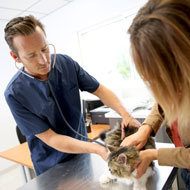Millions fear vets judge their pet care

At least 2.4 million dog owners (1 in 4) and 1.8 million cat owners (1 in 5) fear judgement by their vet.
Millions of pet owners across the UK fear their vet judges their quality of care, according to new research.
A survey by insurance firm Legal and General found that at least 2.4 million dog owners (1 in 4) and 1.8 million cat owners (1 in 5) fear judgement by their vet.
It also found that older pet owners (aged 54-72) were the least worried about their vet’s opinion of them. But millennials (aged 22-37) were almost twice as likely to worry their vets judge them.
Pet owners cited ‘lack of exercise’, ‘poor grooming’ and ‘inadequate companionship’ as the top reasons for feeling guilty about how they look after their animals.
The figures also reveal that while most dogs get at least one walk a day, one in every five dogs do not. This equates to around 1.9 million dogs who wait at least 48 hours between walks.
The study found that it’s at the seven-hour mark that most owners feel guilty about leaving their dogs alone. Millennials at work or otherwise out of the house were the most likely to leave their dogs for more than seven hours at a time.
‘Our results suggest it’s our lifestyles that are most likely to get in the way,’ the researchers conclude. ‘Young professionals who are cash-rich but time-poor find it the hardest to walk their dogs as often as they should and keep them company at home.
‘It’s made many millennials splurge on gadgets and treats for their pets such as ‘pawsecco’ and foam mattresses, but getting the basic welfare needs right is most important, including companionship, exercise and diet.’



 The Veterinary Medicines Directorate (VMD) is inviting applications from veterinary students to attend a one-week extramural studies (EMS) placement in July 2026.
The Veterinary Medicines Directorate (VMD) is inviting applications from veterinary students to attend a one-week extramural studies (EMS) placement in July 2026.